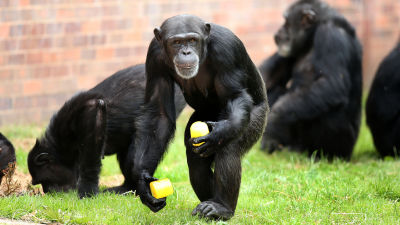Young chimpanzees make similar sounds to human babies, say Portsmouth researchers

Young chimpanzees are capable of making similar sounds to human babies as they begin to learn to speak which researchers say may help explain the evolution of speech.
Researchers from the University of Portsmouth filmed 28 infant chimpanzees at a sanctuary in Zambia as they made sounds such as grunts, whimpers, laughter, screams, hoos, barks, squeaks and pant hoots.
They found that the chimpanzees were capable of vocal functional flexibility which is a building block in human language development.
The authors of the study, published in iScience, explain that the ability to produce sounds that can fulfil a variety of functions is fundamental to how we learn to speak.
But they said that it had long been believed that non-human primates did not share this skill.
A university spokeswoman said: "Human babies make noises that have specific purposes.
"Screams, laughs and cries for instance all have a rigid purpose and clear emotion attached to them. But there are other free speech sounds, like pre-babbling, that are more flexible in their function.
"New research has found that infant and juvenile chimps demonstrate a similar vocal flexibility, which implies the foundations for speech are rooted in our primate evolutionary heritage."
Dr Derry Taylor, from the University of Portsmouth's Department of Psychology, said: "All living things communicate, but only humans communicate using language. How this came to be is an unsolved mystery within science.
"Until now we didn't have evidence of vocal functional flexibility in non-human primates early on.
"This discovery holds profound implications for our understanding of the origins of human language."
The researchers, who worked with colleagues from the University of Neuchatel in Switzerland and Universite Clermont Auvergne in France, said the chimps produced calls with different moods - positive, neutral, or negative - alongside a variety of facial expressions and movements in similar ways to human babies.
The spokeswoman said: "These flexibly expressed call types, particularly grunts, also prompted distinct responses from social partners based on how they were expressed with certain behaviours.
"The findings demonstrated a clear parallel with existing human infant research."
Want a quick briefing on the biggest news stories? Listen to our award-winning podcast to find out What You Need To Know.